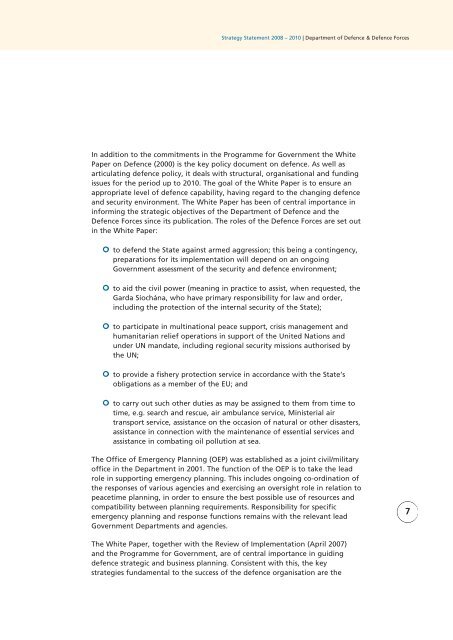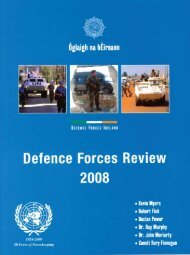Strategy Statement 2008 - 2010 - Department of Defence
Strategy Statement 2008 - 2010 - Department of Defence
Strategy Statement 2008 - 2010 - Department of Defence
Create successful ePaper yourself
Turn your PDF publications into a flip-book with our unique Google optimized e-Paper software.
<strong>Strategy</strong> <strong>Statement</strong> <strong>2008</strong> – <strong>2010</strong> | <strong>Department</strong> <strong>of</strong> <strong>Defence</strong> & <strong>Defence</strong> Forces<br />
In addition to the commitments in the Programme for Government the White<br />
Paper on <strong>Defence</strong> (2000) is the key policy document on defence. As well as<br />
articulating defence policy, it deals with structural, organisational and funding<br />
issues for the period up to <strong>2010</strong>. The goal <strong>of</strong> the White Paper is to ensure an<br />
appropriate level <strong>of</strong> defence capability, having regard to the changing defence<br />
and security environment. The White Paper has been <strong>of</strong> central importance in<br />
informing the strategic objectives <strong>of</strong> the <strong>Department</strong> <strong>of</strong> <strong>Defence</strong> and the<br />
<strong>Defence</strong> Forces since its publication. The roles <strong>of</strong> the <strong>Defence</strong> Forces are set out<br />
in the White Paper:<br />
to defend the State against armed aggression; this being a contingency,<br />
preparations for its implementation will depend on an ongoing<br />
Government assessment <strong>of</strong> the security and defence environment;<br />
to aid the civil power (meaning in practice to assist, when requested, the<br />
Garda Síochána, who have primary responsibility for law and order,<br />
including the protection <strong>of</strong> the internal security <strong>of</strong> the State);<br />
to participate in multinational peace support, crisis management and<br />
humanitarian relief operations in support <strong>of</strong> the United Nations and<br />
under UN mandate, including regional security missions authorised by<br />
the UN;<br />
to provide a fishery protection service in accordance with the State’s<br />
obligations as a member <strong>of</strong> the EU; and<br />
to carry out such other duties as may be assigned to them from time to<br />
time, e.g. search and rescue, air ambulance service, Ministerial air<br />
transport service, assistance on the occasion <strong>of</strong> natural or other disasters,<br />
assistance in connection with the maintenance <strong>of</strong> essential services and<br />
assistance in combating oil pollution at sea.<br />
The Office <strong>of</strong> Emergency Planning (OEP) was established as a joint civil/military<br />
<strong>of</strong>fice in the <strong>Department</strong> in 2001. The function <strong>of</strong> the OEP is to take the lead<br />
role in supporting emergency planning. This includes ongoing co-ordination <strong>of</strong><br />
the responses <strong>of</strong> various agencies and exercising an oversight role in relation to<br />
peacetime planning, in order to ensure the best possible use <strong>of</strong> resources and<br />
compatibility between planning requirements. Responsibility for specific<br />
emergency planning and response functions remains with the relevant lead<br />
Government <strong>Department</strong>s and agencies.<br />
7<br />
The White Paper, together with the Review <strong>of</strong> Implementation (April 2007)<br />
and the Programme for Government, are <strong>of</strong> central importance in guiding<br />
defence strategic and business planning. Consistent with this, the key<br />
strategies fundamental to the success <strong>of</strong> the defence organisation are the
















